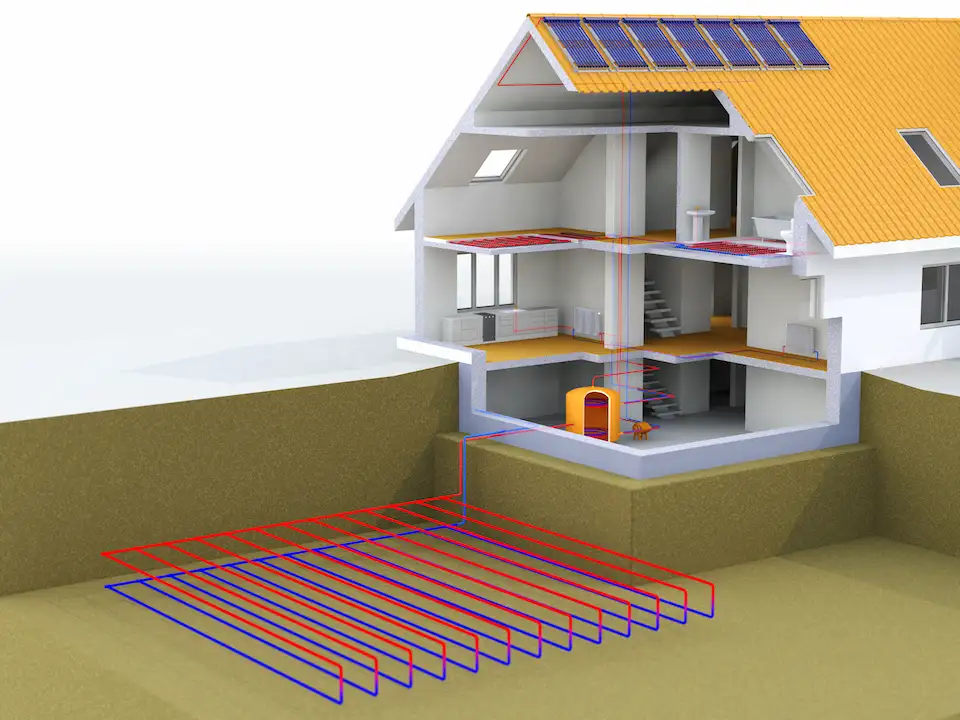June 30, 2023
Advantages of Geothermal Heating and Cooling Systems


Geothermal heating and cooling systems have emerged as a sustainable and efficient solution for maintaining comfortable indoor temperatures in residential and commercial buildings. These innovative systems utilize the constant temperature of the Earth to provide both heating and cooling, offering significant benefits over traditional HVAC systems. Join our geothermal system professionals as we explore the advantages of geothermal heat pumps and their versatility in meeting diverse heating and cooling needs.
What is a Geothermal Heating and Cooling System?
A geothermal heating and cooling system, also known as a ground source heat pump (GSHP), is a sustainable and energy-efficient system that uses the Earth’s natural heat to provide heating and cooling for residential, commercial, and industrial buildings. Unlike traditional HVAC systems that rely on fossil fuels or electricity, geothermal systems leverage the relatively constant temperature of the Earth to transfer heat energy.
Geothermal Heating: Efficient Warmth for Colder Months
A geothermal heat pump system operates by utilizing the relatively constant temperature of the Earth to extract heat and transfer it to a building for space heating. By combining geothermal with a zoned heating system, you can greatly increase heating efficiency.
How a Geothermal Heat Pump Provides Optimal Comfort
The process begins with a closed-loop system buried underground or submerged in a nearby body of water. This loop contains a fluid, typically a mixture of water and antifreeze, that circulates through the system.
During winter, the fluid absorbs heat from the Earth through a heat exchanger. The Earth acts as a heat source, providing a continuous supply of thermal energy. The fluid, now carrying the extracted heat, is then pumped to a compressor unit located indoors. The compressor unit amplifies the temperature of the heat to a level suitable for heating the building.
Geothermal Heating Advantages: Consistent and Cost-Effective Solutions
Geothermal heating offers several advantages over traditional heating systems, making it a popular choice for many homeowners and businesses.
These advantages include:
- Consistent warmth throughout the heating season.
- Stable heat source from the Earth’s constant underground temperatures.
- Precise control of heating output, minimizing temperature fluctuations.
- Quiet operation, creating a peaceful indoor environment.
- Cost-effective with long-term energy savings.
- High efficiency, delivering more heat per unit of electricity consumed.
- Minimal maintenance requirements, reducing maintenance costs.
- Environmentally friendly, reducing reliance on fossil fuels and lowering greenhouse gas emissions.
Geothermal Cooling: Comfortable Summers with Energy Efficiency
Geothermal cooling offers a sustainable and energy-efficient solution for maintaining comfortable indoor temperatures during the summer months.
The Science Behind Geothermal Cooling
The process begins with a closed-loop system, similar to that used in geothermal heating. The loop consists of pipes buried underground or submerged in a body of water. A fluid, typically a mixture of water and antifreeze, circulates through the loop and absorbs heat from the building.
As the warm fluid returns to the geothermal heat pump unit, it enters a heat exchanger. In this heat exchanger, the heat is transferred to the Earth, which absorbs the excess thermal energy. The now-cooled fluid is then pumped back into the building, where it effectively lowers the indoor temperature.
Geothermal Cooling Benefits: A Sustainable and Cost-Effective Choice
Benefits of geothermal heating solutions include:
- Utilizes the Earth’s natural heat sink for efficient cooling.
- Reduces reliance on conventional cooling systems and their high energy consumption.
- Operates with high efficiency, delivering reliable cooling performance.
- Lower energy consumption results in reduced utility costs.
- Long lifespan and minimal maintenance requirements.
- Sustainable choice, minimizing reliance on refrigerants with high global warming potential.
Advantages of Geothermal Systems for Year-Round Comfort
Geothermal systems offer a range of advantages for year-round comfort.
Energy Efficiency: Lowering Utility Costs and Environmental Impact
Geothermal systems are known for their high energy efficiency, resulting in significant utility cost savings. Geothermal heat pumps deliver more heating or cooling output per unit of energy consumed, translating into lower energy bills, as long as it is properly installed and passed an HVAC inspection.
Consistent Comfort: Maintaining Optimal Indoor Temperatures
Geothermal systems provide consistent comfort by offering reliable heating and cooling performance. Unlike air-source heat pumps that depend on fluctuating outdoor air temperatures, geothermal heat pumps rely on the Earth’s relatively stable underground temperatures. This stability ensures that the heat source or sink is consistently available, leading to a more reliable and uniform indoor temperature control throughout the year.
Renewable Energy: Reducing Dependence on Fossil Fuels
Geothermal systems utilize renewable energy sources, reducing dependence on finite fossil fuels. By harnessing the Earth’s natural heat, they tap into a virtually unlimited and sustainable energy supply. This reliance on renewable energy contributes to a more sustainable energy mix and mitigates the environmental impact associated with burning fossil fuels.
Sizing and Installation Considerations for Residential Applications
When it comes to sizing and installing a geothermal system for residential applications, several factors need to be considered to ensure optimal performance and efficiency.
These considerations include:
- Heat Load Calculation: Factors such as the size of the home, insulation levels, climate conditions, and desired indoor temperature play a crucial role in this calculation.
- Soil and Site Evaluation: Factors such as soil composition, moisture content, and available land area need to be evaluated to ensure efficient heat exchange with the Earth.
- Loop System Design: Different configurations, such as horizontal, vertical, or pond/lake loops, may be suitable depending on the available space and soil conditions.
- Equipment Selection: Factors such as heating and cooling capacity, energy efficiency ratings, and compatibility with the ground loop system need to be considered.
- Professional Installation: Hiring a qualified and experienced geothermal installer ensures that the system is correctly sized, properly installed, and compliant with local regulations.
Maintenance and Operation Tips for Optimal Performance
To maintain the optimal performance and longevity of a geothermal system in residential applications, the following geothermal maintenance services and operation tips are recommended:
- Regular filter cleaning and replacement
- Annual HVAC system inspections
- Loop system maintenance
- Thermostat programming
- System Protection as a safeguard against electrical damage
Geothermal Heat Pump Efficiency Ratings: Understanding the Metrics
Geothermal heat pump efficiency ratings provide valuable information about a system’s energy performance and help consumers make informed decisions.
The following metrics are commonly used to evaluate geothermal heat pump efficiency:
- Coefficient of Performance (COP): COP represents the ratio of heat output to the electrical energy input for heating mode. Higher COP values indicate greater efficiency. A typical geothermal heat pump can achieve a COP of 3 to 5, meaning it produces three to five units of heat for every unit of electricity consumed.
- Energy Efficiency Ratio (EER): EER measures the cooling output divided by the electrical energy input for cooling mode. Higher EER values indicate greater cooling efficiency. Geothermal heat pumps typically have EER values between 13 and 30.
- Seasonal Energy Efficiency Ratio (SEER): SEER provides an average cooling efficiency rating over an entire cooling season. It considers part-load performance and standby power consumption. Higher SEER values indicate better overall cooling efficiency. SEER calculators can help you determine how much you can save by switching to a more efficient system.
- Heating Seasonal Performance Factor (HSPF): HSPF measures the average heating efficiency over an entire heating season. It considers part-load performance and standby power consumption. Higher HSPF values indicate better overall heating efficiency.
FAQs about Geothermal HVAC Systems
What are the energy savings associated with geothermal systems?
Geothermal systems can reduce energy consumption and related emissions by up to 70% compared to conventional systems.
Can geothermal systems be integrated with existing HVAC systems?
Yes, geothermal systems can be integrated with existing HVAC systems to provide supplemental heating or cooling, or to replace the conventional system entirely.
How long do geothermal heat pumps typically last?
Geothermal heat pumps have a typical lifespan of 20 to 25 years for the heat pump unit, while the ground loop system can last 50 years or more.
Are there any government incentives for installing geothermal systems?
Yes, there are often government incentives available for installing geothermal systems, such as tax credits, rebates, or grants, aimed at promoting energy efficiency and renewable energy adoption.
Contact Bowman Mechanical Services for Reliable and Professional Geothermal Solutions
Looking for reliable and professional geothermal solutions? Contact Bowman Mechanical Services today.
With our expertise in geothermal systems, we provide top-quality installation, maintenance, and repair services for residential heating and cooling systems. Experience the energy efficiency and year-round comfort that geothermal technology offers.
Contact us today to schedule a consultation and take the first step towards a sustainable and cost-effective HVAC solution by calling (919) 822-8512 or filling out our contact form below to get started.

